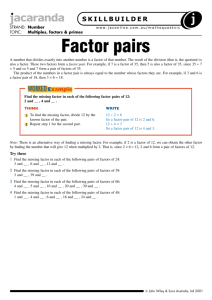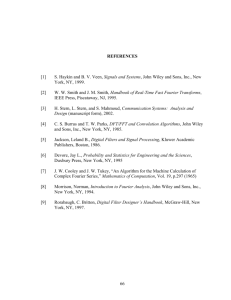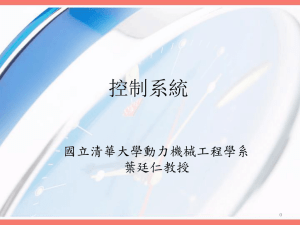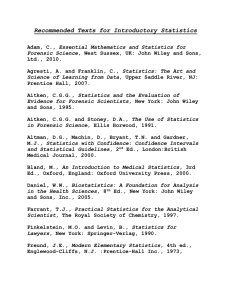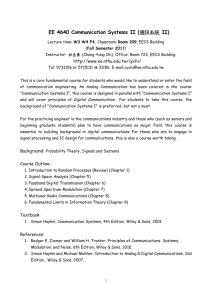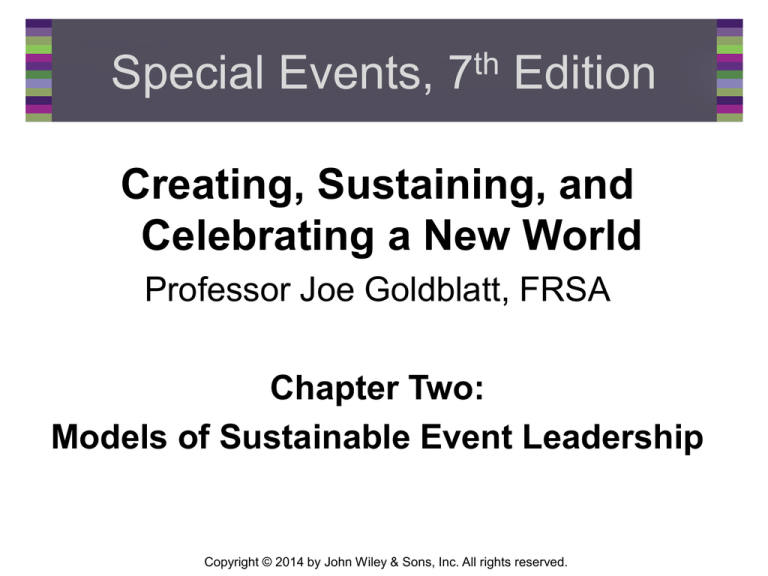
Special Events, 7th Edition
Creating, Sustaining, and
Celebrating a New World
Professor Joe Goldblatt, FRSA
Chapter Two:
Models of Sustainable Event Leadership
Copyright © 2014 by John Wiley & Sons, Inc. All rights reserved.
Copyright © 2014 by John Wiley & Sons, Inc. All rights reserved.
Photo by the Author.
Agenda
1.
2.
3.
4.
5.
6.
7.
8.
9.
Animated introduction
Opening Activity: Objects of Celebration
Chapter One Review
Chapter Two
Book Report Chapter Two
Mini case study discussion four
Global event thought leader Frank Supovitz
Assignments
Questions, answers, and discussion
Copyright © 2014 by John Wiley & Sons, Inc. All rights reserved.
Key Terms
Corporate social responsibility: the corporate commitment to creating and
delivering events that promote corporate responsibility by improving
economic, social and environmental impacts for society.
EMBOK: Event Management Body of Knowledge developed by a group of
industry professionals to establish standards for the global events industry.
EMICS: Event Management Industry Competency Standards developed by the
Canadian Tourism Human Resource Council and Meeting Professionals
International.
Gap analysis: Analysis of the planning gaps that may be present before the
start of an event.
IEMS: International Event Management Standards developed by the Canadian
Tourism Human Resource Council to identify common competencies and
standards for event managers throughout the world.
Mind mapping: A process for pictorially linking thoughts and ideas to create a
mind map that represents the inputs of various event stakeholders.
Copyright © 2014 by John Wiley & Sons, Inc. All rights reserved.
Key Terms (cont’d.)
Project management: A system composed of commissioning tasks,
milestones, closure and other key elements to provide a common vocabulary
and process for managing projects throughout the world.
Qualitative research: Research that uses language and observation to identify
and analyze the meaning provided by interviewees.
Quantitative research: Research that may be enumerated in terms of its
outcomes.
Reliability: the extent to which your research is accurate
SWOT analysis: The strengths, weaknesses, opportunities and threats posed
by future events.
Tempo: The pace of the planning and delivery process of the event.
Triple-bottom-line evaluation: A comprehensive evaluation of the social,
economic and environmental impacts of an event.
Validity: The accuracy of the research instrument as evidenced through pilot
testing and reviews prior to conducting a full scale study.
Copyright © 2014 by John Wiley & Sons, Inc. All rights reserved.
Learning Objectives
• Recognize and use the five phases of the
modern event planning process
• Identify the strengths, weaknesses,
opportunities, and threats of your event
• Create an accurate blueprint for your event
• Conduct a comprehensive needs assessment
• Complete a gap analysis for your event
• Communicate effectively with event stakeholders
• Critically integrate corporate social responsibility
(CSR) into every event
Copyright © 2014 by John Wiley & Sons, Inc. All rights reserved.
Lecture One Review
1.
2.
3.
4.
Defining special events
Impacts
Change
Career Opportunities
Copyright © 2014 by John Wiley & Sons, Inc. All rights reserved.
Lecture Two
•
•
•
•
•
•
Five phases of event management
SWOT analysis
Needs assessment
Gap analysis
Effective communications
Corporate Social Responsibility (CSR)
Copyright © 2014 by John Wiley & Sons, Inc. All rights reserved.
Activity
• Share your object of celebration with one
other student.
• Describe to your partner why you selected
this item and why it is important to you.
• Describe the memories that it creates.
• Your partner should be prepared to share
your comments with the class.
• Five minutes.
Copyright © 2014 by John Wiley & Sons, Inc. All rights reserved.
Photo by the Author.
Discussion
1. What did you learn about objects of
celebration?
2. Why are objects of celebration important
for events?
Copyright © 2014 by John Wiley & Sons, Inc. All rights reserved.
Five Phases
1.
2.
3.
4.
5.
Research
Design
Planning
Coordination
Evaluation
Copyright © 2014 by John Wiley & Sons, Inc. All rights reserved.
SWOT Analysis
1.
2.
3.
4.
Strengths
Weaknesses
Opportunities
Threats
Copyright © 2014 by John Wiley & Sons, Inc. All rights reserved.
Needs Assessment
1. The needs assessment allows us to align
the event plan with the needs of the
stakeholders.
2. Stakeholders are those who are invested
in the event.
3. Research helps identify the needs, wants,
and desires of the event stakeholders.
Copyright © 2014 by John Wiley & Sons, Inc. All rights reserved.
Gap Analysis
1. The gap analysis identifies key gaps in
the research phase.
2. The gaps must be identified and closed
prior to the design phase.
3. Once the gaps are closed, the design
phase may proceed.
Copyright © 2014 by John Wiley & Sons, Inc. All rights reserved.
Effective Communications
1. Communication between event
stakeholders is critically important.
2. Communication may include social media
as well as email.
3. It is important to handle communications
immediately and confirm receipt.
Copyright © 2014 by John Wiley & Sons, Inc. All rights reserved.
Corporate Social Responsibility
(CSR)
1. CSR is the attempt by corporate bodies
to integrate social responsibilities into
their strategic planning and operations
process.
2. CSR may include environmental
sustainability as well as creating social
capital in communities where the event is
being conducted.
Copyright © 2014 by John Wiley & Sons, Inc. All rights reserved.
Chapter Two Book Report
•
•
•
•
10 minute presentation
Everyone participates equally
Overview of the chapter
Three questions from book review group for
class
• Three questions from class for book review
group
• Final question from the instructor for the
entire class
Copyright © 2014 by John Wiley & Sons, Inc. All rights reserved.
Mini-Case Discussion:
4. Conventions
1. How could the event planners have better
honored their leaders?
2. How could the event planners have
shared the history of the organization
without boring the audience?
Copyright © 2014 by John Wiley & Sons, Inc. All rights reserved.
Global Event Thought Leader:
Frank Supovitz, Senior Vice President for Events,
U.S. National Football League (NFL)
1. How does Frank Supovitz see the
technological changes impacting special
events?
Copyright © 2014 by John Wiley & Sons, Inc. All rights reserved.
Assignment
• Read and be prepared to discuss Chapter
3.
• Read and be prepared to discuss mini
case study 6.
Copyright © 2014 by John Wiley & Sons, Inc. All rights reserved.
Questions, Answers, and
Discussion
Copyright © 2014 by John Wiley & Sons, Inc. All rights reserved.

